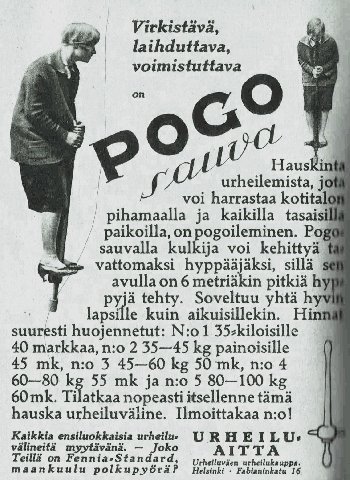
You rarely see it in such use nowadays. But in spoken language, as others have stated, it's commonly used to show politeness. There's a related verb teititellä, and something called sinunkaupat which does not refer to "your shops"

And neiti is for naimaton, in both senses.Cory wrote:Rouva has the connotation of "old lady" to me
Yes, and...?Cory wrote: Rouva has the connotation of "old lady" to me
I wonder if she also wore high heels riding her Fennia-Standard. Because nothing says "I never have to hop off this thing in a hurry" like high heels.sammy wrote:

Onko neiti neiti, vai onko neiti naitu?Upphew wrote:And neiti is for naimaton, in both senses.Cory wrote:Rouva has the connotation of "old lady" to me
This could originally have been influenced by the German distinction between sie and Sie / ihr and Ihr... you can see this "polite" capital T also in the pogo stick ad.Keravalainen wrote:Hi!
It wasn't in English textbooks - I know for sure.
But in Finnish business correspondence it was usual to write "Te" and "Teidän" etc at that time.
- - I think this error was contaminated from there.
Well...I can't say that I can figure it out...the ryök- part seems to have a negative connotation..."scoundrel, wretch", "robber", "garbage" etc. and the -kynä part?...an archaic word meaning "quill"...or maybe "pencil"... Hmmmmm???Pursuivant wrote:I'll remember to address you then ryökkynä
(ok, who of you is the first one to get that etymology)